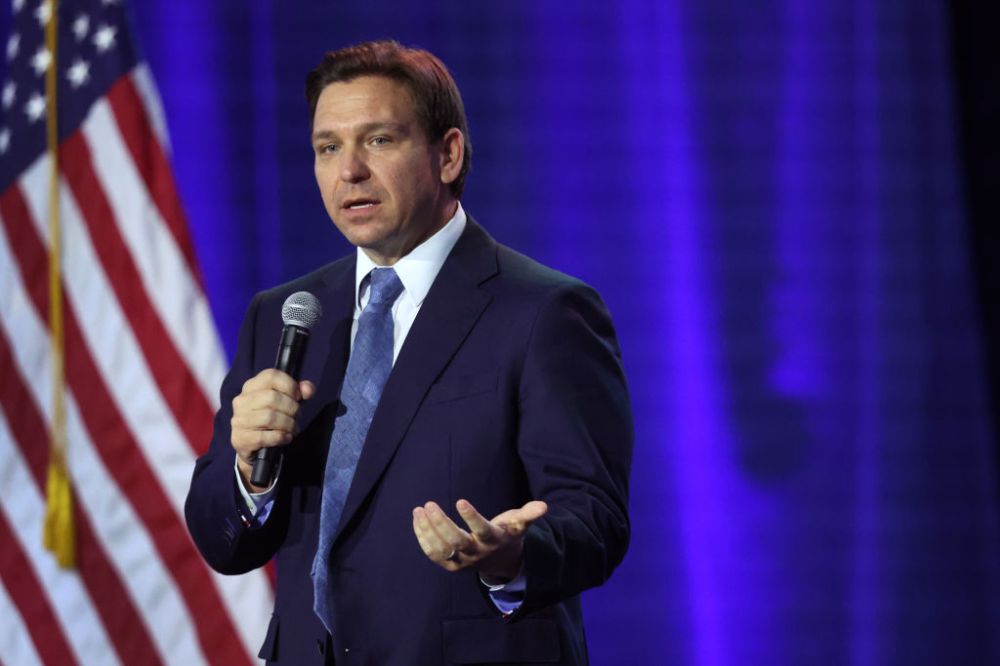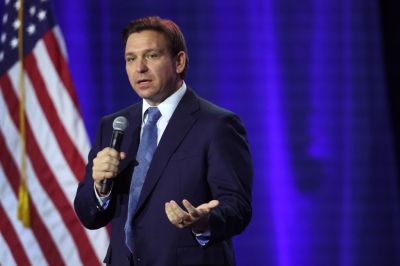Cheeseburger and Fries
Ron Desantis made some news last week when he said, “While the U.S. has many vital national interests—securing our borders, addressing the crisis of readiness within our military, achieving energy security and independence, and checking the economic, cultural, and military power of the Chinese Communist Party—becoming further entangled in a territorial dispute between Ukraine and Russia is not one of them.”
I found this statement fascinating. Not because of the substance—about which you can read any number of thought pieces—but because of where it came from.
And this brings us to a fun conversation about “candidate questionnaires.” They’re a nuisance to all campaigns everywhere, and I’d like to explain why.
- They’re not meant to be fair. Questionnaires come from interest groups. The interests vary—they can be policy groups or wings of the party, etc. But they want you to answer their questions in a very specific way. “Understanding that all dogs slobber and have the ability to poop on rugs, do you agree that cats are better household pets than dogs?”
- They pin you down in a primary. Many of these questions are intended to lock candidates into policy positions during a primary that aren’t shared by the majority of general election voters. Candidates have to navigate those waters all the time on the big ticket items—abortion, obviously—but there are all sorts of issues that your candidate would never need to opine upon but for this candidate questionnaire. “Do you believe that every word of the Bible is the inerrant word of God and that the theory of evolution is only one scientific theory among many that should be taught to children in public school?”
- They’re a time suck. Literally every group has figured out the candidate questionnaire game and they come flooding in. Because of the first two points above, there is also no way that you can simply answer them all by going through what your candidate has previously said publicly. This leaves some junior policy or communications staffer drafting answers out of whole cloth that then will need to be reviewed by senior staff and eventually the candidate. And even with the questions that the candidate has previously answered in some (or many) forms, some adult needs to make sure it aligns with what the group actually wants to hear. Otherwise, you’re just antagonizing them.
So all these questionnaires are coming in. You have to decide which ones are worth your time. And just because a group is small doesn’t mean they aren’t mighty. Just because the issues are obscure doesn’t mean your candidate can skate by without doing some research. In the end, you’re looking at probably the equivalent of one full-time employee just on candidate questionnaires and similar issues.
But that hasn’t even addressed the other half: What about the BIGGIES? Back in the day, the Grover Norquist Americans for Tax Reform tax pledge was the biggest. It wasn’t a traditional questionnaire: You didn’t get to have a say, you just had to sign the pledge. Or not. I’m sure all the 2024 candidates will sign it this year because why not. But it won’t matter. The legs are falling off the Reagan stool—fiscal conservatism, foreign-policy interventionism, and social conservatism—and no tax pledge can change that. Grover’s famous Wednesday Meetings in D.C. aren’t the talk of the town anymore either. The last time I went seemed more like the old guard just trying to hold onto relevance.
In that sense, then, the weight of the candidate questionnaires tells us a lot more about the relevance of these interest groups asking the questions than anything that comes out of the questionnaires themselves.
And that brings us back to THIS candidate questionnaire … from Tucker Carlson.
It’s not unheard of for news organizations to send questionnaires. And even beyond that, what else is a traditional “editorial board” than an oral questionnaire delivered by lots of journalists around a conference room table with your candidate at one end of it?
So while I’m sure many of you were expecting me to dunk on the Tucker questionnaire, I’m not going to. Here were the six questions that Tucker sent to a whole bunch of candidates:
- Is opposing Russia in Ukraine a vital American national strategic interest?
- What specifically is our objective in Ukraine, and how will we know when we’ve achieved it?
- What is the limit of funding and material you would be willing to send to the government of Ukraine?
- Should the United States support regime change in Russia?
- Given that Russia’s economy and currency are stronger than before the war, do you believe that U.S. sanctions have been effective?
- Do you believe the United States faces the risk of nuclear war with Russia?
Those all seem like pretty important questions to me and none (with perhaps a slight tilt in No. 5) are particularly leading. But here’s what’s interesting—the candidates very much treated them like the generic candidate questionnaires I’ve described above. Some wrote out answers. Some sent transcripts of interviews they’d given. Some sent statements but didn’t address specific questions.
Candidates and potential candidates that answered Tucker: Donald Trump, Ron DeSantis, Mike Pence, Kristi Noem, Gregg Abbott, Tim Scott, Chris Christie, Vivek Ramaswamy.
Candidates and potential candidates that didn’t answer Tucker: Nikki Haley, Mike Pompeo, Asa Hutchinson, John Bolton, Chris Sununu
As you can probably see from above, the candidates whose views align with Tucker were far more likely to respond, but there were quite a few who responded anyway. Tucker shared the answers in his March 13 show, and here is what he had to say about some of those who responded in the latter category:
Pence: “Pence suggests that anyone who disagrees with his views on Ukraine is a disloyal American, saying there is no room for Putin apologists in the Republican Party. Mike Pence did not specify who he was talking about but we suspect this show is included in that treasonous category.”
Christie: Wants “to fight and win a war against both Russia and China simultaneously or he warns Iran and North Korea could take over the world.” (FWIW you can read Christie’s statement here and I don’t think it says either of those two things.)
Abbott: “Not so bold or precise.”
Scott: “Not many details but he called for degrading the Russian military. He did not explain what the point of that might be.”
I’d assume that many of these campaigns think that Tucker’s audience may not feel exactly the same way as Tucker about Ukraine. Or they saw it as a Sister Souljah moment of sorts. Or they decided the airtime was worth it regardless of the coverage. That was one route.
But there was another creative option. Nikki Haley didn’t respond to Tucker. She released her answers publicly the next morning instead. In response, Tucker skewered her on his show, saying she “ignored” him. But she got some coverage for her pro-Ukraine answers that clearly broke dramatically with the Tucker narrative.
Then you’ve got DeSantis’ answer. It got covered initially as an anti-Ukraine answer, but that's less obvious when you read the whole thing. I want to talk more about what is emerging as the DeSantis strategy overall, but it’s shaping up to be more of a rope-a-dope than I was expecting. Don’t let Trump move too far away from you on any issue … but also don’t sound crazy. On the one hand, I think this may help DeSantis avoid some of the problems that Ted Cruz had on immigration in 2016 with Trump flanking him from the right. On the other hand, he risks sounding like Trump-lite. Or worse, that he doesn’t stand for anything at all.
So what did we learn? As of the week of March 13, Tucker is averaging 3.15 million total viewers each night. He’s easily the No. 1-rated cable news host. And while it isn’t that many people in a country of 330 million Americans, it’s worth considering that just more than 30 million folks voted in the 2016 GOP primaries.
Which means this isn’t the last you’ll see of the Tucker candidate questionnaires, I predict. They will be the most influential of the cycle and cause the most heartburn for the campaigns. I’m fascinated by the fact that we’ve already got at least four different strategies playing out—tell the audience what they want to hear, don’t tell the audience what they want to hear, don’t waste time on an unfriendly audience, use the questions as a separate earned media opportunity.
There are some areas that I don’t think there will be enough contrast to be worthwhile (wokeness … eye roll). But Tucker is a smart guy and I could imagine some very illuminating questions on immigration policy and entitlement reform that would be enlightening for everyone—whether you’re a Tucker conservative, Reagan conservative, or just a remnant wandering these lonely roads to 2024.
Milkshake
Always important to remember where we came from … and how good we have it. Air conditioning, polio vaccine, Popeye’s Chicken Sandwich. We are blessed.







Please note that we at The Dispatch hold ourselves, our work, and our commenters to a higher standard than other places on the internet. We welcome comments that foster genuine debate or discussion—including comments critical of us or our work—but responses that include ad hominem attacks on fellow Dispatch members or are intended to stoke fear and anger may be moderated.
With your membership, you only have the ability to comment on The Morning Dispatch articles. Consider upgrading to join the conversation everywhere.